WTO, International Political Economy, and Trade Dynamics
VerifiedAdded on 2020/04/07
|16
|3445
|78
Essay
AI Summary
This essay provides an in-depth analysis of the World Trade Organization (WTO), its role, and impact on international trade. It explores the WTO's functions, including overseeing trade negotiations, settling disputes, and implementing trade policies. The essay discusses the challenges faced by the WTO, such as the United States' trade policy agenda and the failure of the Doha Round negotiations, which have led to a crisis of confidence and the rise of bilateral trade agreements. It also examines the causes and benefits of economic cooperation, highlighting the role of organizations like the WTO and the European Union in promoting international trade, free trade agreements, and economic growth. The essay further analyzes the inequalities within the WTO, where developed countries often have more influence, leading to dissatisfaction among developing nations. It emphasizes the need for the WTO to address the interests of developing countries and promote equal treatment among member states to maintain its relevance and effectiveness in fostering global trade and economic cooperation.
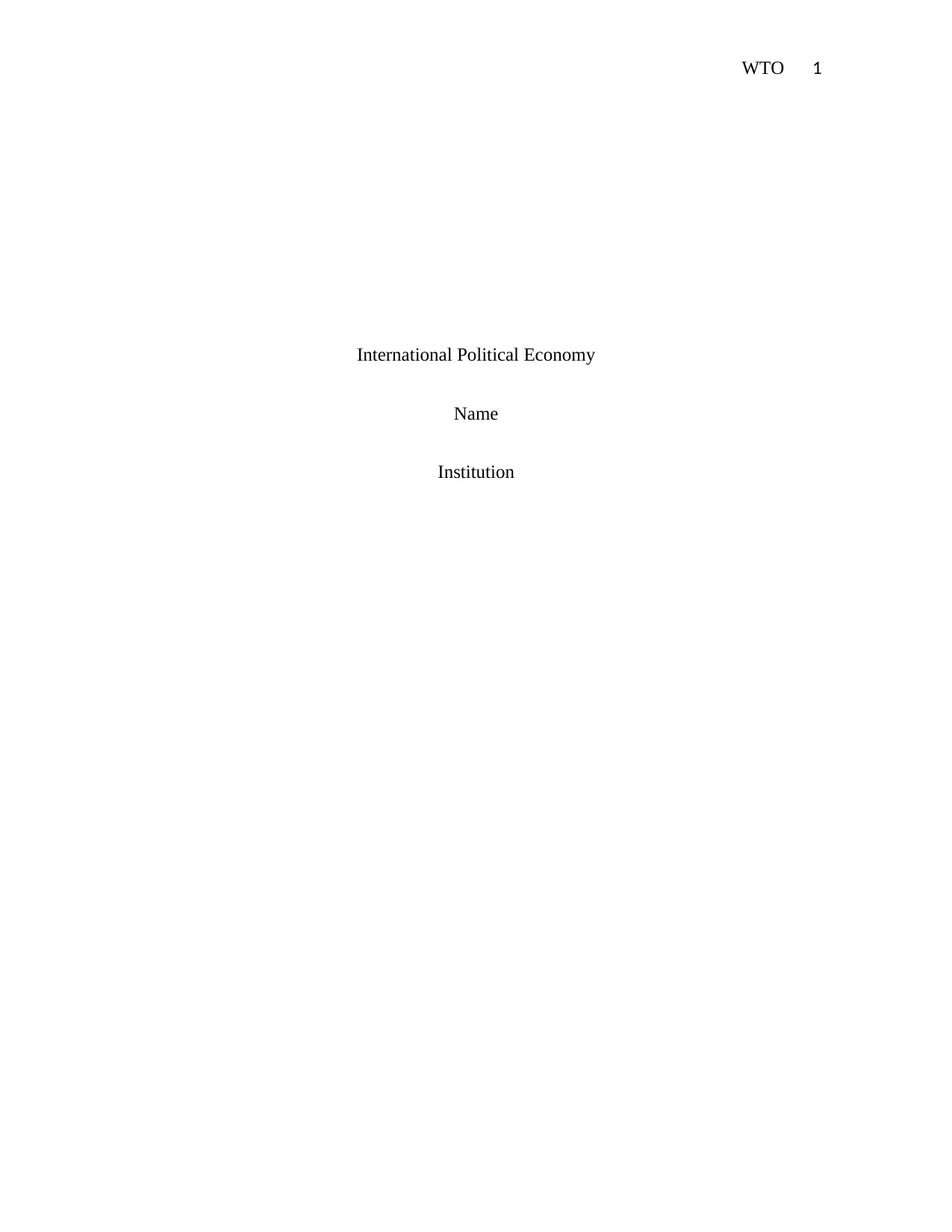
WTO 1
International Political Economy
Name
Institution
International Political Economy
Name
Institution
Paraphrase This Document
Need a fresh take? Get an instant paraphrase of this document with our AI Paraphraser
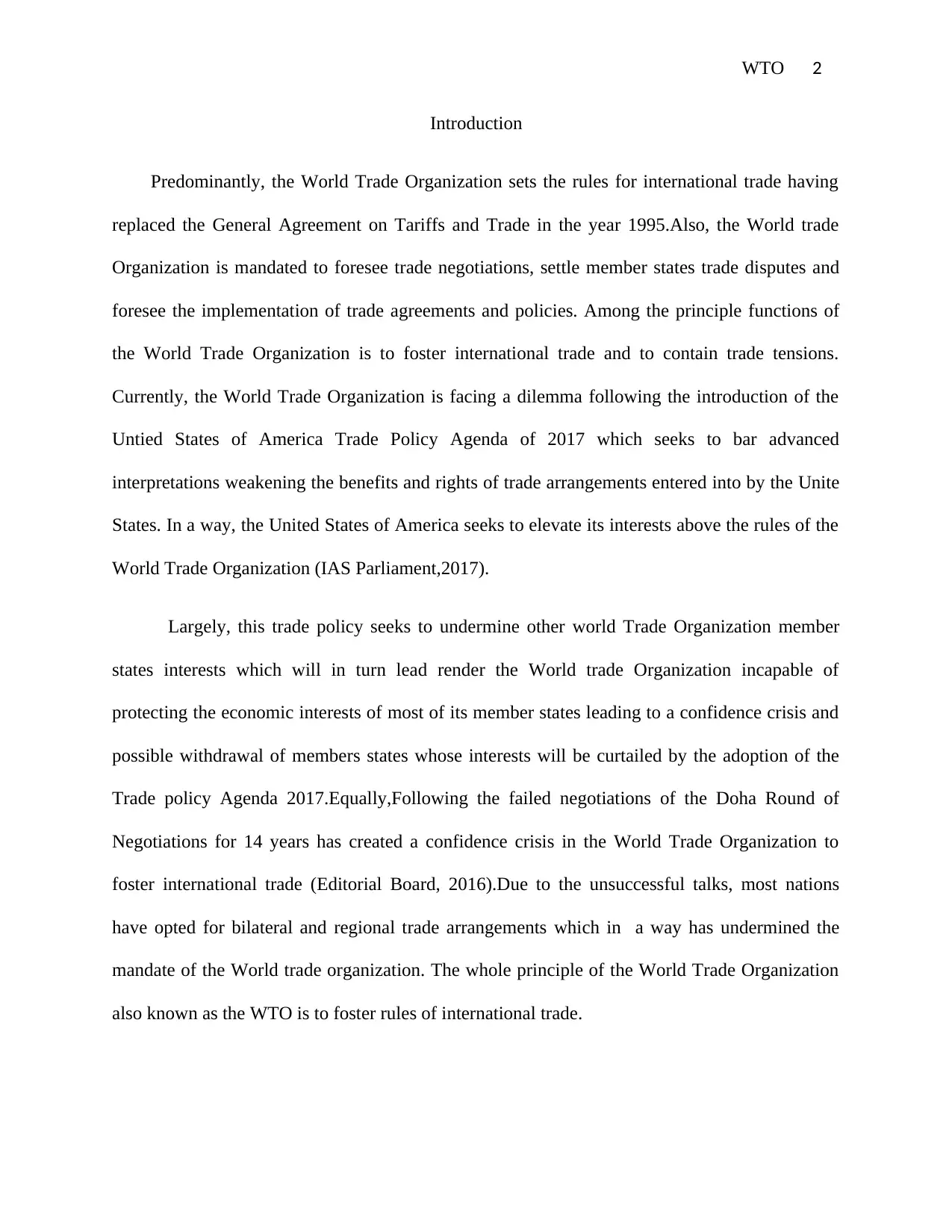
WTO 2
Introduction
Predominantly, the World Trade Organization sets the rules for international trade having
replaced the General Agreement on Tariffs and Trade in the year 1995.Also, the World trade
Organization is mandated to foresee trade negotiations, settle member states trade disputes and
foresee the implementation of trade agreements and policies. Among the principle functions of
the World Trade Organization is to foster international trade and to contain trade tensions.
Currently, the World Trade Organization is facing a dilemma following the introduction of the
Untied States of America Trade Policy Agenda of 2017 which seeks to bar advanced
interpretations weakening the benefits and rights of trade arrangements entered into by the Unite
States. In a way, the United States of America seeks to elevate its interests above the rules of the
World Trade Organization (IAS Parliament,2017).
Largely, this trade policy seeks to undermine other world Trade Organization member
states interests which will in turn lead render the World trade Organization incapable of
protecting the economic interests of most of its member states leading to a confidence crisis and
possible withdrawal of members states whose interests will be curtailed by the adoption of the
Trade policy Agenda 2017.Equally,Following the failed negotiations of the Doha Round of
Negotiations for 14 years has created a confidence crisis in the World Trade Organization to
foster international trade (Editorial Board, 2016).Due to the unsuccessful talks, most nations
have opted for bilateral and regional trade arrangements which in a way has undermined the
mandate of the World trade organization. The whole principle of the World Trade Organization
also known as the WTO is to foster rules of international trade.
Introduction
Predominantly, the World Trade Organization sets the rules for international trade having
replaced the General Agreement on Tariffs and Trade in the year 1995.Also, the World trade
Organization is mandated to foresee trade negotiations, settle member states trade disputes and
foresee the implementation of trade agreements and policies. Among the principle functions of
the World Trade Organization is to foster international trade and to contain trade tensions.
Currently, the World Trade Organization is facing a dilemma following the introduction of the
Untied States of America Trade Policy Agenda of 2017 which seeks to bar advanced
interpretations weakening the benefits and rights of trade arrangements entered into by the Unite
States. In a way, the United States of America seeks to elevate its interests above the rules of the
World Trade Organization (IAS Parliament,2017).
Largely, this trade policy seeks to undermine other world Trade Organization member
states interests which will in turn lead render the World trade Organization incapable of
protecting the economic interests of most of its member states leading to a confidence crisis and
possible withdrawal of members states whose interests will be curtailed by the adoption of the
Trade policy Agenda 2017.Equally,Following the failed negotiations of the Doha Round of
Negotiations for 14 years has created a confidence crisis in the World Trade Organization to
foster international trade (Editorial Board, 2016).Due to the unsuccessful talks, most nations
have opted for bilateral and regional trade arrangements which in a way has undermined the
mandate of the World trade organization. The whole principle of the World Trade Organization
also known as the WTO is to foster rules of international trade.
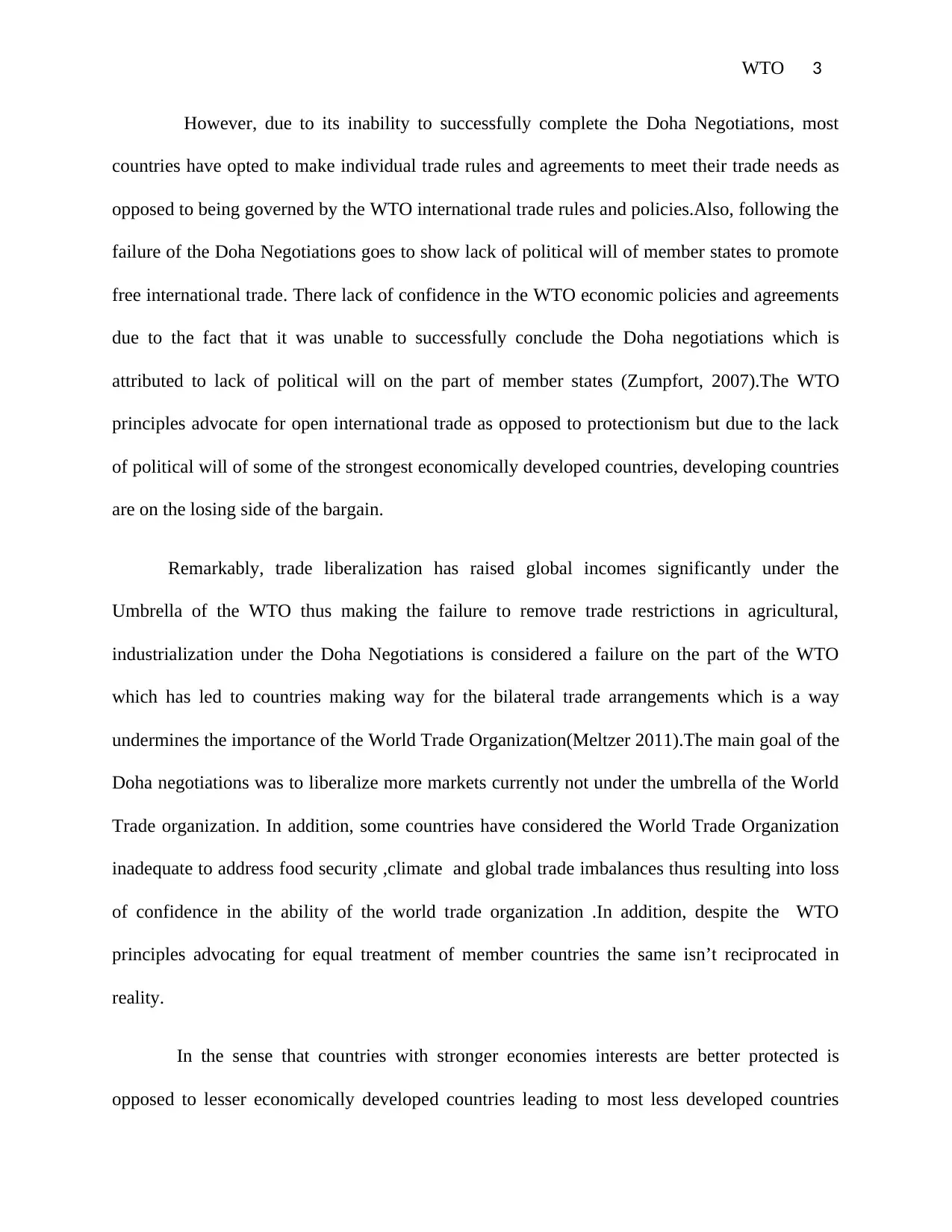
WTO 3
However, due to its inability to successfully complete the Doha Negotiations, most
countries have opted to make individual trade rules and agreements to meet their trade needs as
opposed to being governed by the WTO international trade rules and policies.Also, following the
failure of the Doha Negotiations goes to show lack of political will of member states to promote
free international trade. There lack of confidence in the WTO economic policies and agreements
due to the fact that it was unable to successfully conclude the Doha negotiations which is
attributed to lack of political will on the part of member states (Zumpfort, 2007).The WTO
principles advocate for open international trade as opposed to protectionism but due to the lack
of political will of some of the strongest economically developed countries, developing countries
are on the losing side of the bargain.
Remarkably, trade liberalization has raised global incomes significantly under the
Umbrella of the WTO thus making the failure to remove trade restrictions in agricultural,
industrialization under the Doha Negotiations is considered a failure on the part of the WTO
which has led to countries making way for the bilateral trade arrangements which is a way
undermines the importance of the World Trade Organization(Meltzer 2011).The main goal of the
Doha negotiations was to liberalize more markets currently not under the umbrella of the World
Trade organization. In addition, some countries have considered the World Trade Organization
inadequate to address food security ,climate and global trade imbalances thus resulting into loss
of confidence in the ability of the world trade organization .In addition, despite the WTO
principles advocating for equal treatment of member countries the same isn’t reciprocated in
reality.
In the sense that countries with stronger economies interests are better protected is
opposed to lesser economically developed countries leading to most less developed countries
However, due to its inability to successfully complete the Doha Negotiations, most
countries have opted to make individual trade rules and agreements to meet their trade needs as
opposed to being governed by the WTO international trade rules and policies.Also, following the
failure of the Doha Negotiations goes to show lack of political will of member states to promote
free international trade. There lack of confidence in the WTO economic policies and agreements
due to the fact that it was unable to successfully conclude the Doha negotiations which is
attributed to lack of political will on the part of member states (Zumpfort, 2007).The WTO
principles advocate for open international trade as opposed to protectionism but due to the lack
of political will of some of the strongest economically developed countries, developing countries
are on the losing side of the bargain.
Remarkably, trade liberalization has raised global incomes significantly under the
Umbrella of the WTO thus making the failure to remove trade restrictions in agricultural,
industrialization under the Doha Negotiations is considered a failure on the part of the WTO
which has led to countries making way for the bilateral trade arrangements which is a way
undermines the importance of the World Trade Organization(Meltzer 2011).The main goal of the
Doha negotiations was to liberalize more markets currently not under the umbrella of the World
Trade organization. In addition, some countries have considered the World Trade Organization
inadequate to address food security ,climate and global trade imbalances thus resulting into loss
of confidence in the ability of the world trade organization .In addition, despite the WTO
principles advocating for equal treatment of member countries the same isn’t reciprocated in
reality.
In the sense that countries with stronger economies interests are better protected is
opposed to lesser economically developed countries leading to most less developed countries
⊘ This is a preview!⊘
Do you want full access?
Subscribe today to unlock all pages.

Trusted by 1+ million students worldwide
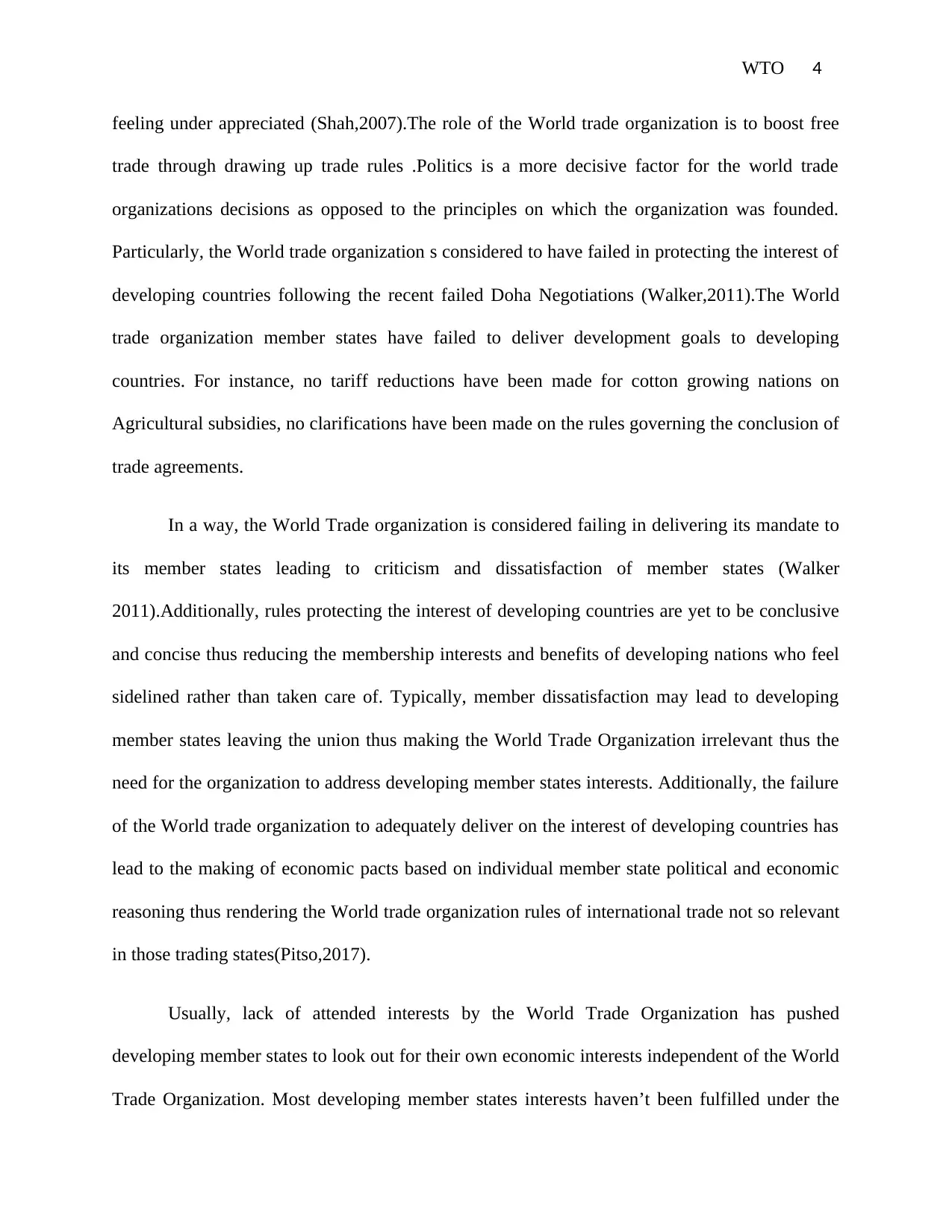
WTO 4
feeling under appreciated (Shah,2007).The role of the World trade organization is to boost free
trade through drawing up trade rules .Politics is a more decisive factor for the world trade
organizations decisions as opposed to the principles on which the organization was founded.
Particularly, the World trade organization s considered to have failed in protecting the interest of
developing countries following the recent failed Doha Negotiations (Walker,2011).The World
trade organization member states have failed to deliver development goals to developing
countries. For instance, no tariff reductions have been made for cotton growing nations on
Agricultural subsidies, no clarifications have been made on the rules governing the conclusion of
trade agreements.
In a way, the World Trade organization is considered failing in delivering its mandate to
its member states leading to criticism and dissatisfaction of member states (Walker
2011).Additionally, rules protecting the interest of developing countries are yet to be conclusive
and concise thus reducing the membership interests and benefits of developing nations who feel
sidelined rather than taken care of. Typically, member dissatisfaction may lead to developing
member states leaving the union thus making the World Trade Organization irrelevant thus the
need for the organization to address developing member states interests. Additionally, the failure
of the World trade organization to adequately deliver on the interest of developing countries has
lead to the making of economic pacts based on individual member state political and economic
reasoning thus rendering the World trade organization rules of international trade not so relevant
in those trading states(Pitso,2017).
Usually, lack of attended interests by the World Trade Organization has pushed
developing member states to look out for their own economic interests independent of the World
Trade Organization. Most developing member states interests haven’t been fulfilled under the
feeling under appreciated (Shah,2007).The role of the World trade organization is to boost free
trade through drawing up trade rules .Politics is a more decisive factor for the world trade
organizations decisions as opposed to the principles on which the organization was founded.
Particularly, the World trade organization s considered to have failed in protecting the interest of
developing countries following the recent failed Doha Negotiations (Walker,2011).The World
trade organization member states have failed to deliver development goals to developing
countries. For instance, no tariff reductions have been made for cotton growing nations on
Agricultural subsidies, no clarifications have been made on the rules governing the conclusion of
trade agreements.
In a way, the World Trade organization is considered failing in delivering its mandate to
its member states leading to criticism and dissatisfaction of member states (Walker
2011).Additionally, rules protecting the interest of developing countries are yet to be conclusive
and concise thus reducing the membership interests and benefits of developing nations who feel
sidelined rather than taken care of. Typically, member dissatisfaction may lead to developing
member states leaving the union thus making the World Trade Organization irrelevant thus the
need for the organization to address developing member states interests. Additionally, the failure
of the World trade organization to adequately deliver on the interest of developing countries has
lead to the making of economic pacts based on individual member state political and economic
reasoning thus rendering the World trade organization rules of international trade not so relevant
in those trading states(Pitso,2017).
Usually, lack of attended interests by the World Trade Organization has pushed
developing member states to look out for their own economic interests independent of the World
Trade Organization. Most developing member states interests haven’t been fulfilled under the
Paraphrase This Document
Need a fresh take? Get an instant paraphrase of this document with our AI Paraphraser
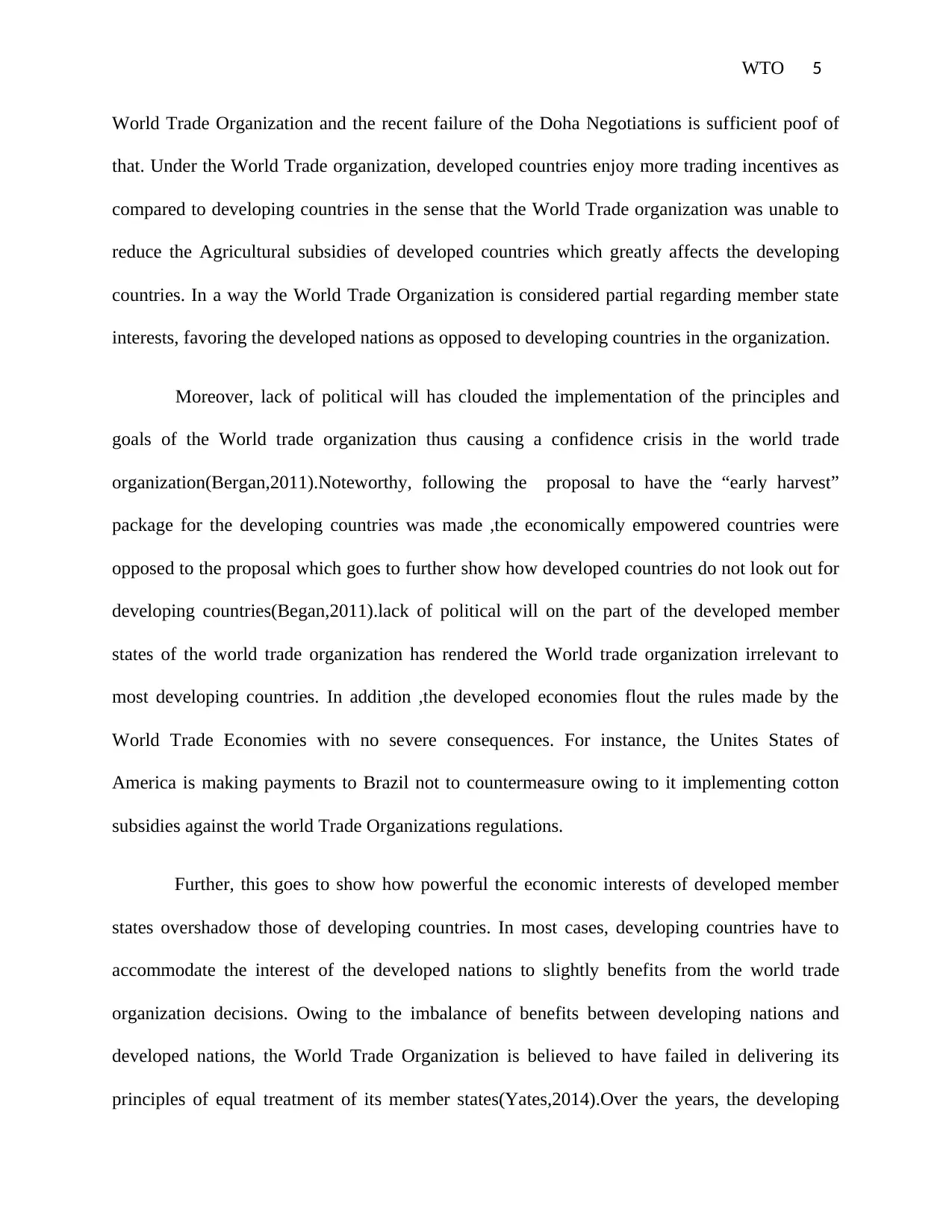
WTO 5
World Trade Organization and the recent failure of the Doha Negotiations is sufficient poof of
that. Under the World Trade organization, developed countries enjoy more trading incentives as
compared to developing countries in the sense that the World Trade organization was unable to
reduce the Agricultural subsidies of developed countries which greatly affects the developing
countries. In a way the World Trade Organization is considered partial regarding member state
interests, favoring the developed nations as opposed to developing countries in the organization.
Moreover, lack of political will has clouded the implementation of the principles and
goals of the World trade organization thus causing a confidence crisis in the world trade
organization(Bergan,2011).Noteworthy, following the proposal to have the “early harvest”
package for the developing countries was made ,the economically empowered countries were
opposed to the proposal which goes to further show how developed countries do not look out for
developing countries(Began,2011).lack of political will on the part of the developed member
states of the world trade organization has rendered the World trade organization irrelevant to
most developing countries. In addition ,the developed economies flout the rules made by the
World Trade Economies with no severe consequences. For instance, the Unites States of
America is making payments to Brazil not to countermeasure owing to it implementing cotton
subsidies against the world Trade Organizations regulations.
Further, this goes to show how powerful the economic interests of developed member
states overshadow those of developing countries. In most cases, developing countries have to
accommodate the interest of the developed nations to slightly benefits from the world trade
organization decisions. Owing to the imbalance of benefits between developing nations and
developed nations, the World Trade Organization is believed to have failed in delivering its
principles of equal treatment of its member states(Yates,2014).Over the years, the developing
World Trade Organization and the recent failure of the Doha Negotiations is sufficient poof of
that. Under the World Trade organization, developed countries enjoy more trading incentives as
compared to developing countries in the sense that the World Trade organization was unable to
reduce the Agricultural subsidies of developed countries which greatly affects the developing
countries. In a way the World Trade Organization is considered partial regarding member state
interests, favoring the developed nations as opposed to developing countries in the organization.
Moreover, lack of political will has clouded the implementation of the principles and
goals of the World trade organization thus causing a confidence crisis in the world trade
organization(Bergan,2011).Noteworthy, following the proposal to have the “early harvest”
package for the developing countries was made ,the economically empowered countries were
opposed to the proposal which goes to further show how developed countries do not look out for
developing countries(Began,2011).lack of political will on the part of the developed member
states of the world trade organization has rendered the World trade organization irrelevant to
most developing countries. In addition ,the developed economies flout the rules made by the
World Trade Economies with no severe consequences. For instance, the Unites States of
America is making payments to Brazil not to countermeasure owing to it implementing cotton
subsidies against the world Trade Organizations regulations.
Further, this goes to show how powerful the economic interests of developed member
states overshadow those of developing countries. In most cases, developing countries have to
accommodate the interest of the developed nations to slightly benefits from the world trade
organization decisions. Owing to the imbalance of benefits between developing nations and
developed nations, the World Trade Organization is believed to have failed in delivering its
principles of equal treatment of its member states(Yates,2014).Over the years, the developing
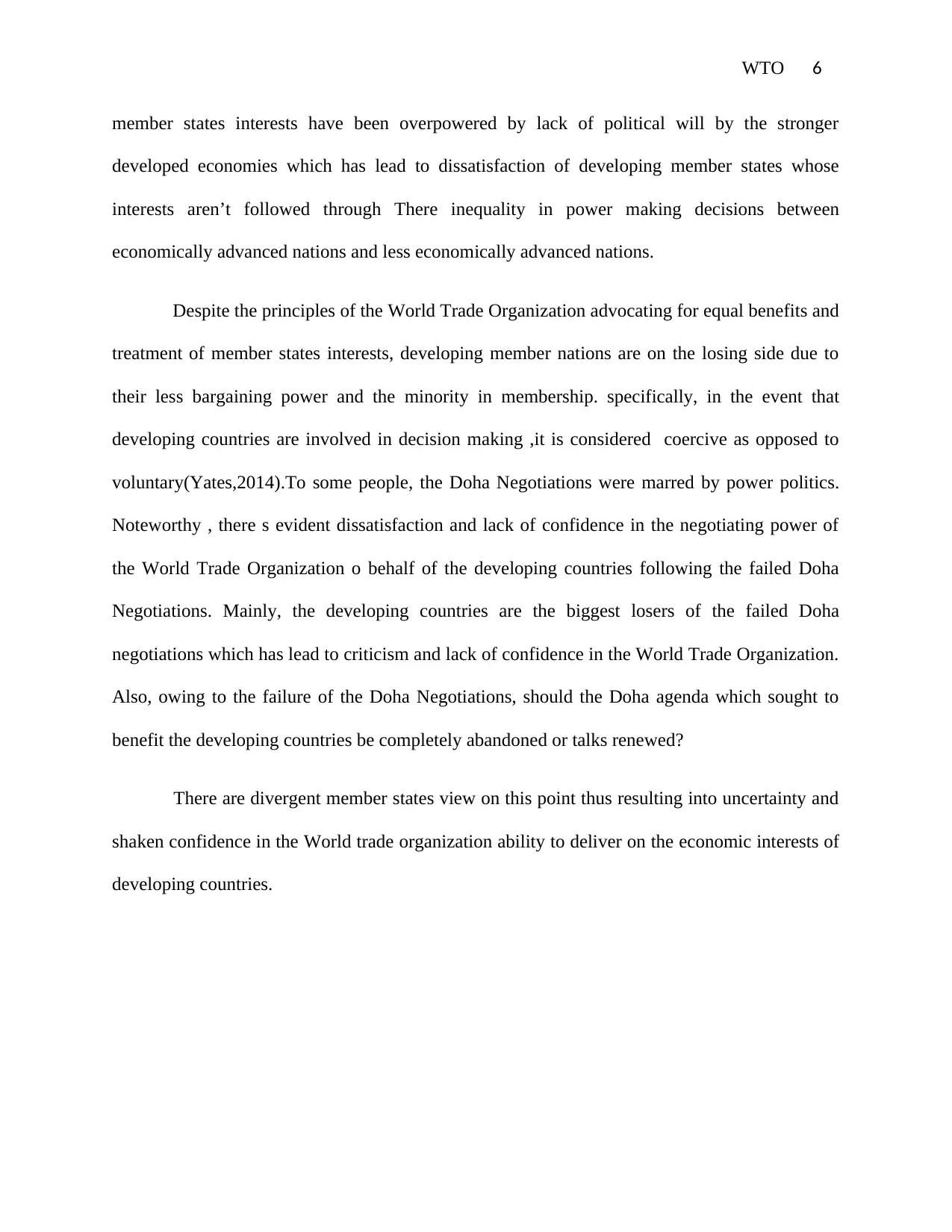
WTO 6
member states interests have been overpowered by lack of political will by the stronger
developed economies which has lead to dissatisfaction of developing member states whose
interests aren’t followed through There inequality in power making decisions between
economically advanced nations and less economically advanced nations.
Despite the principles of the World Trade Organization advocating for equal benefits and
treatment of member states interests, developing member nations are on the losing side due to
their less bargaining power and the minority in membership. specifically, in the event that
developing countries are involved in decision making ,it is considered coercive as opposed to
voluntary(Yates,2014).To some people, the Doha Negotiations were marred by power politics.
Noteworthy , there s evident dissatisfaction and lack of confidence in the negotiating power of
the World Trade Organization o behalf of the developing countries following the failed Doha
Negotiations. Mainly, the developing countries are the biggest losers of the failed Doha
negotiations which has lead to criticism and lack of confidence in the World Trade Organization.
Also, owing to the failure of the Doha Negotiations, should the Doha agenda which sought to
benefit the developing countries be completely abandoned or talks renewed?
There are divergent member states view on this point thus resulting into uncertainty and
shaken confidence in the World trade organization ability to deliver on the economic interests of
developing countries.
member states interests have been overpowered by lack of political will by the stronger
developed economies which has lead to dissatisfaction of developing member states whose
interests aren’t followed through There inequality in power making decisions between
economically advanced nations and less economically advanced nations.
Despite the principles of the World Trade Organization advocating for equal benefits and
treatment of member states interests, developing member nations are on the losing side due to
their less bargaining power and the minority in membership. specifically, in the event that
developing countries are involved in decision making ,it is considered coercive as opposed to
voluntary(Yates,2014).To some people, the Doha Negotiations were marred by power politics.
Noteworthy , there s evident dissatisfaction and lack of confidence in the negotiating power of
the World Trade Organization o behalf of the developing countries following the failed Doha
Negotiations. Mainly, the developing countries are the biggest losers of the failed Doha
negotiations which has lead to criticism and lack of confidence in the World Trade Organization.
Also, owing to the failure of the Doha Negotiations, should the Doha agenda which sought to
benefit the developing countries be completely abandoned or talks renewed?
There are divergent member states view on this point thus resulting into uncertainty and
shaken confidence in the World trade organization ability to deliver on the economic interests of
developing countries.
⊘ This is a preview!⊘
Do you want full access?
Subscribe today to unlock all pages.

Trusted by 1+ million students worldwide
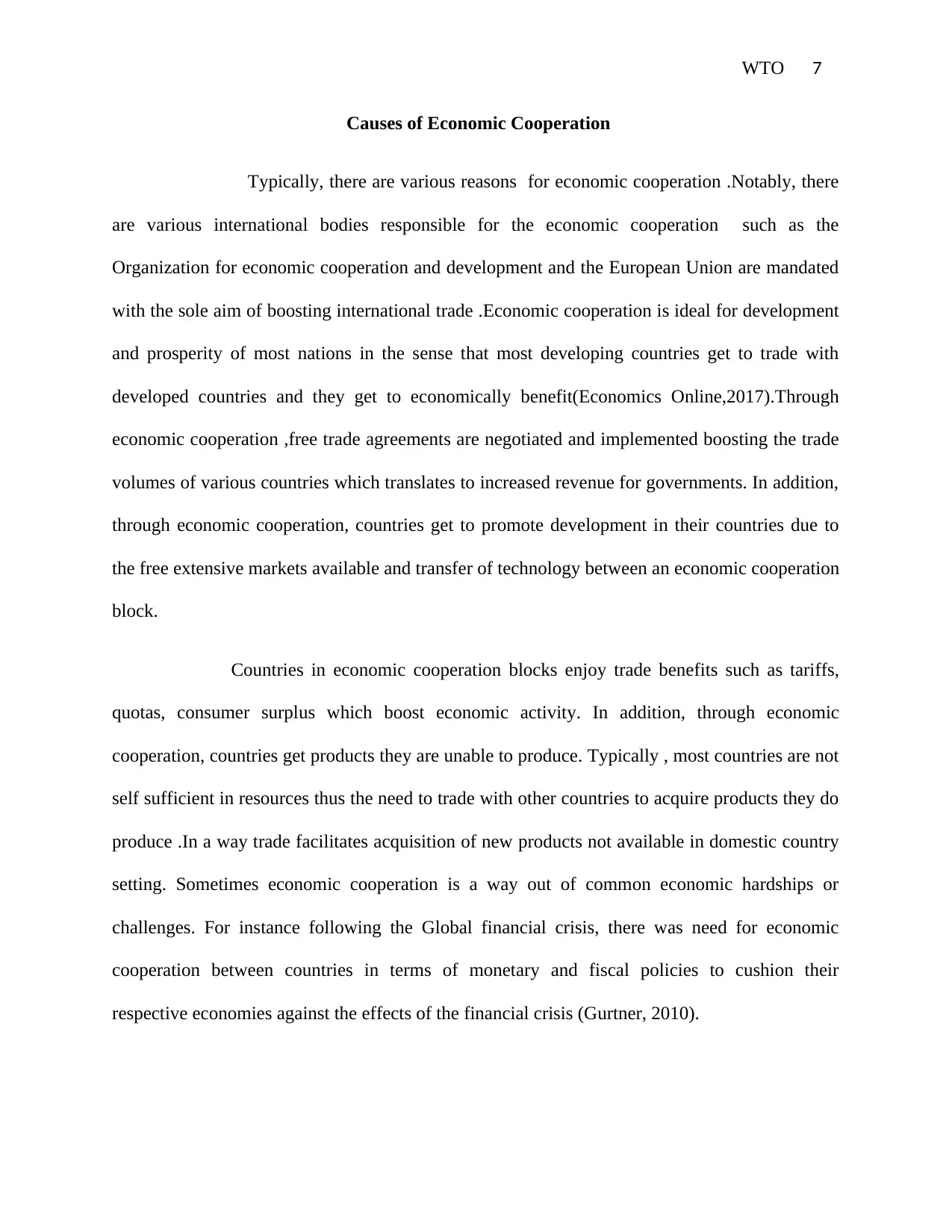
WTO 7
Causes of Economic Cooperation
Typically, there are various reasons for economic cooperation .Notably, there
are various international bodies responsible for the economic cooperation such as the
Organization for economic cooperation and development and the European Union are mandated
with the sole aim of boosting international trade .Economic cooperation is ideal for development
and prosperity of most nations in the sense that most developing countries get to trade with
developed countries and they get to economically benefit(Economics Online,2017).Through
economic cooperation ,free trade agreements are negotiated and implemented boosting the trade
volumes of various countries which translates to increased revenue for governments. In addition,
through economic cooperation, countries get to promote development in their countries due to
the free extensive markets available and transfer of technology between an economic cooperation
block.
Countries in economic cooperation blocks enjoy trade benefits such as tariffs,
quotas, consumer surplus which boost economic activity. In addition, through economic
cooperation, countries get products they are unable to produce. Typically , most countries are not
self sufficient in resources thus the need to trade with other countries to acquire products they do
produce .In a way trade facilitates acquisition of new products not available in domestic country
setting. Sometimes economic cooperation is a way out of common economic hardships or
challenges. For instance following the Global financial crisis, there was need for economic
cooperation between countries in terms of monetary and fiscal policies to cushion their
respective economies against the effects of the financial crisis (Gurtner, 2010).
Causes of Economic Cooperation
Typically, there are various reasons for economic cooperation .Notably, there
are various international bodies responsible for the economic cooperation such as the
Organization for economic cooperation and development and the European Union are mandated
with the sole aim of boosting international trade .Economic cooperation is ideal for development
and prosperity of most nations in the sense that most developing countries get to trade with
developed countries and they get to economically benefit(Economics Online,2017).Through
economic cooperation ,free trade agreements are negotiated and implemented boosting the trade
volumes of various countries which translates to increased revenue for governments. In addition,
through economic cooperation, countries get to promote development in their countries due to
the free extensive markets available and transfer of technology between an economic cooperation
block.
Countries in economic cooperation blocks enjoy trade benefits such as tariffs,
quotas, consumer surplus which boost economic activity. In addition, through economic
cooperation, countries get products they are unable to produce. Typically , most countries are not
self sufficient in resources thus the need to trade with other countries to acquire products they do
produce .In a way trade facilitates acquisition of new products not available in domestic country
setting. Sometimes economic cooperation is a way out of common economic hardships or
challenges. For instance following the Global financial crisis, there was need for economic
cooperation between countries in terms of monetary and fiscal policies to cushion their
respective economies against the effects of the financial crisis (Gurtner, 2010).
Paraphrase This Document
Need a fresh take? Get an instant paraphrase of this document with our AI Paraphraser
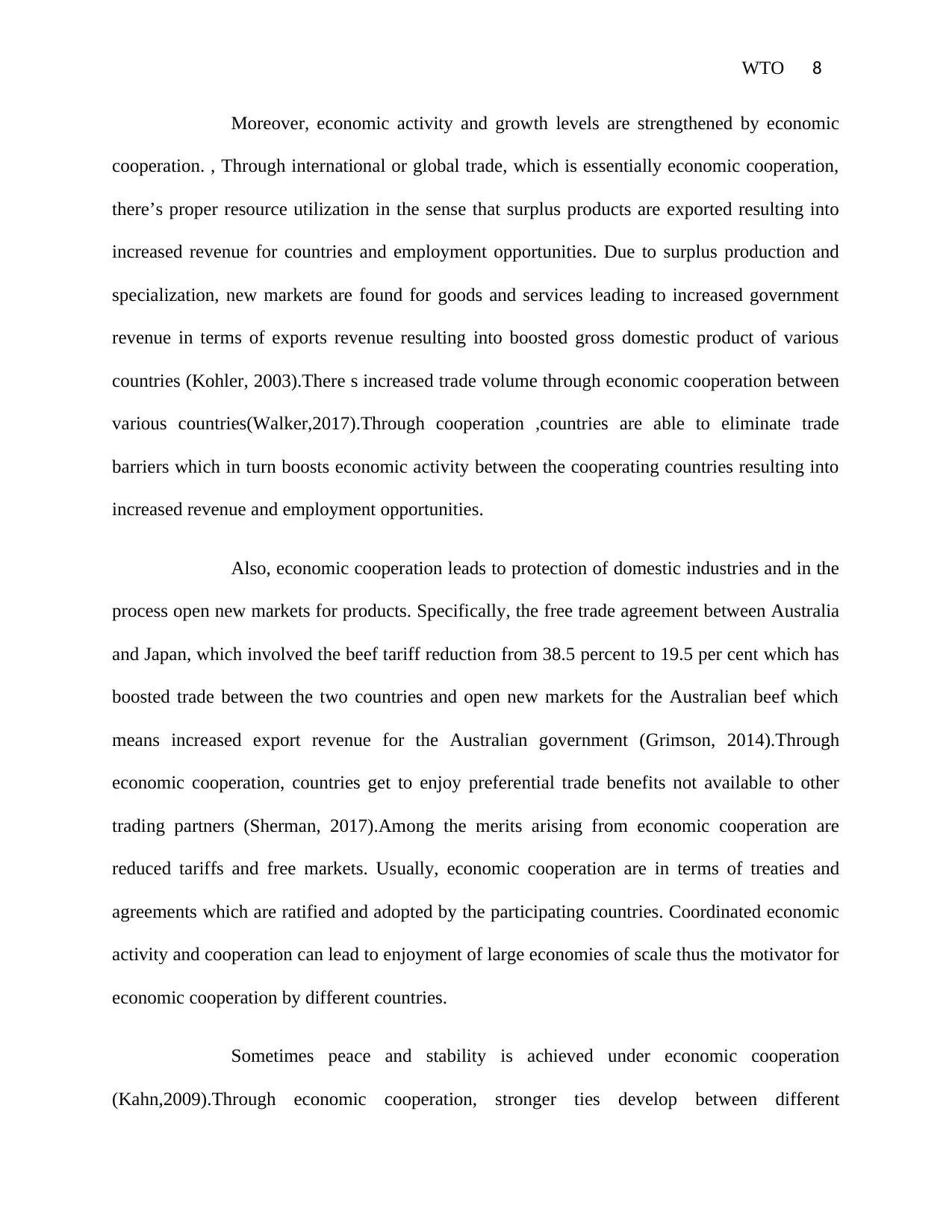
WTO 8
Moreover, economic activity and growth levels are strengthened by economic
cooperation. , Through international or global trade, which is essentially economic cooperation,
there’s proper resource utilization in the sense that surplus products are exported resulting into
increased revenue for countries and employment opportunities. Due to surplus production and
specialization, new markets are found for goods and services leading to increased government
revenue in terms of exports revenue resulting into boosted gross domestic product of various
countries (Kohler, 2003).There s increased trade volume through economic cooperation between
various countries(Walker,2017).Through cooperation ,countries are able to eliminate trade
barriers which in turn boosts economic activity between the cooperating countries resulting into
increased revenue and employment opportunities.
Also, economic cooperation leads to protection of domestic industries and in the
process open new markets for products. Specifically, the free trade agreement between Australia
and Japan, which involved the beef tariff reduction from 38.5 percent to 19.5 per cent which has
boosted trade between the two countries and open new markets for the Australian beef which
means increased export revenue for the Australian government (Grimson, 2014).Through
economic cooperation, countries get to enjoy preferential trade benefits not available to other
trading partners (Sherman, 2017).Among the merits arising from economic cooperation are
reduced tariffs and free markets. Usually, economic cooperation are in terms of treaties and
agreements which are ratified and adopted by the participating countries. Coordinated economic
activity and cooperation can lead to enjoyment of large economies of scale thus the motivator for
economic cooperation by different countries.
Sometimes peace and stability is achieved under economic cooperation
(Kahn,2009).Through economic cooperation, stronger ties develop between different
Moreover, economic activity and growth levels are strengthened by economic
cooperation. , Through international or global trade, which is essentially economic cooperation,
there’s proper resource utilization in the sense that surplus products are exported resulting into
increased revenue for countries and employment opportunities. Due to surplus production and
specialization, new markets are found for goods and services leading to increased government
revenue in terms of exports revenue resulting into boosted gross domestic product of various
countries (Kohler, 2003).There s increased trade volume through economic cooperation between
various countries(Walker,2017).Through cooperation ,countries are able to eliminate trade
barriers which in turn boosts economic activity between the cooperating countries resulting into
increased revenue and employment opportunities.
Also, economic cooperation leads to protection of domestic industries and in the
process open new markets for products. Specifically, the free trade agreement between Australia
and Japan, which involved the beef tariff reduction from 38.5 percent to 19.5 per cent which has
boosted trade between the two countries and open new markets for the Australian beef which
means increased export revenue for the Australian government (Grimson, 2014).Through
economic cooperation, countries get to enjoy preferential trade benefits not available to other
trading partners (Sherman, 2017).Among the merits arising from economic cooperation are
reduced tariffs and free markets. Usually, economic cooperation are in terms of treaties and
agreements which are ratified and adopted by the participating countries. Coordinated economic
activity and cooperation can lead to enjoyment of large economies of scale thus the motivator for
economic cooperation by different countries.
Sometimes peace and stability is achieved under economic cooperation
(Kahn,2009).Through economic cooperation, stronger ties develop between different
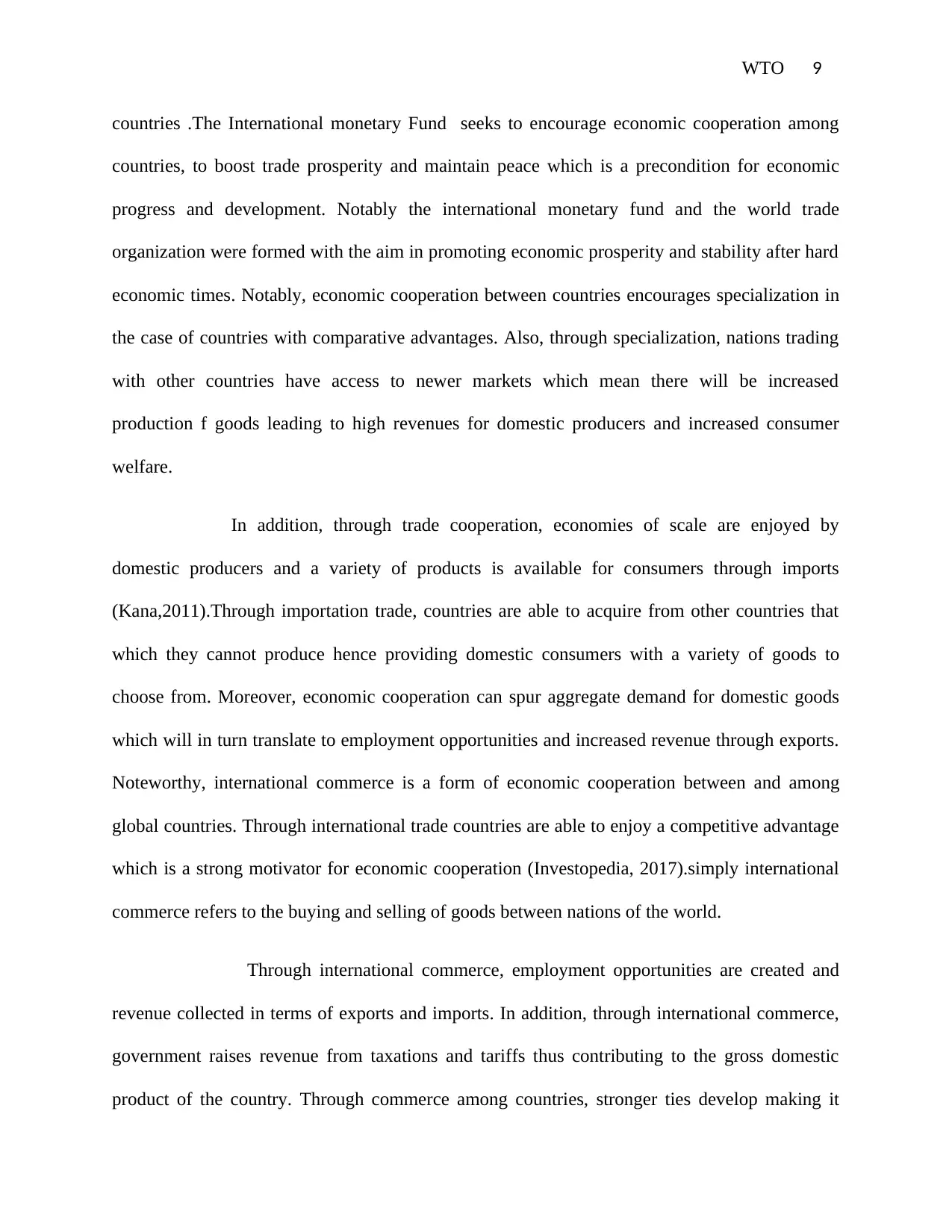
WTO 9
countries .The International monetary Fund seeks to encourage economic cooperation among
countries, to boost trade prosperity and maintain peace which is a precondition for economic
progress and development. Notably the international monetary fund and the world trade
organization were formed with the aim in promoting economic prosperity and stability after hard
economic times. Notably, economic cooperation between countries encourages specialization in
the case of countries with comparative advantages. Also, through specialization, nations trading
with other countries have access to newer markets which mean there will be increased
production f goods leading to high revenues for domestic producers and increased consumer
welfare.
In addition, through trade cooperation, economies of scale are enjoyed by
domestic producers and a variety of products is available for consumers through imports
(Kana,2011).Through importation trade, countries are able to acquire from other countries that
which they cannot produce hence providing domestic consumers with a variety of goods to
choose from. Moreover, economic cooperation can spur aggregate demand for domestic goods
which will in turn translate to employment opportunities and increased revenue through exports.
Noteworthy, international commerce is a form of economic cooperation between and among
global countries. Through international trade countries are able to enjoy a competitive advantage
which is a strong motivator for economic cooperation (Investopedia, 2017).simply international
commerce refers to the buying and selling of goods between nations of the world.
Through international commerce, employment opportunities are created and
revenue collected in terms of exports and imports. In addition, through international commerce,
government raises revenue from taxations and tariffs thus contributing to the gross domestic
product of the country. Through commerce among countries, stronger ties develop making it
countries .The International monetary Fund seeks to encourage economic cooperation among
countries, to boost trade prosperity and maintain peace which is a precondition for economic
progress and development. Notably the international monetary fund and the world trade
organization were formed with the aim in promoting economic prosperity and stability after hard
economic times. Notably, economic cooperation between countries encourages specialization in
the case of countries with comparative advantages. Also, through specialization, nations trading
with other countries have access to newer markets which mean there will be increased
production f goods leading to high revenues for domestic producers and increased consumer
welfare.
In addition, through trade cooperation, economies of scale are enjoyed by
domestic producers and a variety of products is available for consumers through imports
(Kana,2011).Through importation trade, countries are able to acquire from other countries that
which they cannot produce hence providing domestic consumers with a variety of goods to
choose from. Moreover, economic cooperation can spur aggregate demand for domestic goods
which will in turn translate to employment opportunities and increased revenue through exports.
Noteworthy, international commerce is a form of economic cooperation between and among
global countries. Through international trade countries are able to enjoy a competitive advantage
which is a strong motivator for economic cooperation (Investopedia, 2017).simply international
commerce refers to the buying and selling of goods between nations of the world.
Through international commerce, employment opportunities are created and
revenue collected in terms of exports and imports. In addition, through international commerce,
government raises revenue from taxations and tariffs thus contributing to the gross domestic
product of the country. Through commerce among countries, stronger ties develop making it
⊘ This is a preview!⊘
Do you want full access?
Subscribe today to unlock all pages.

Trusted by 1+ million students worldwide
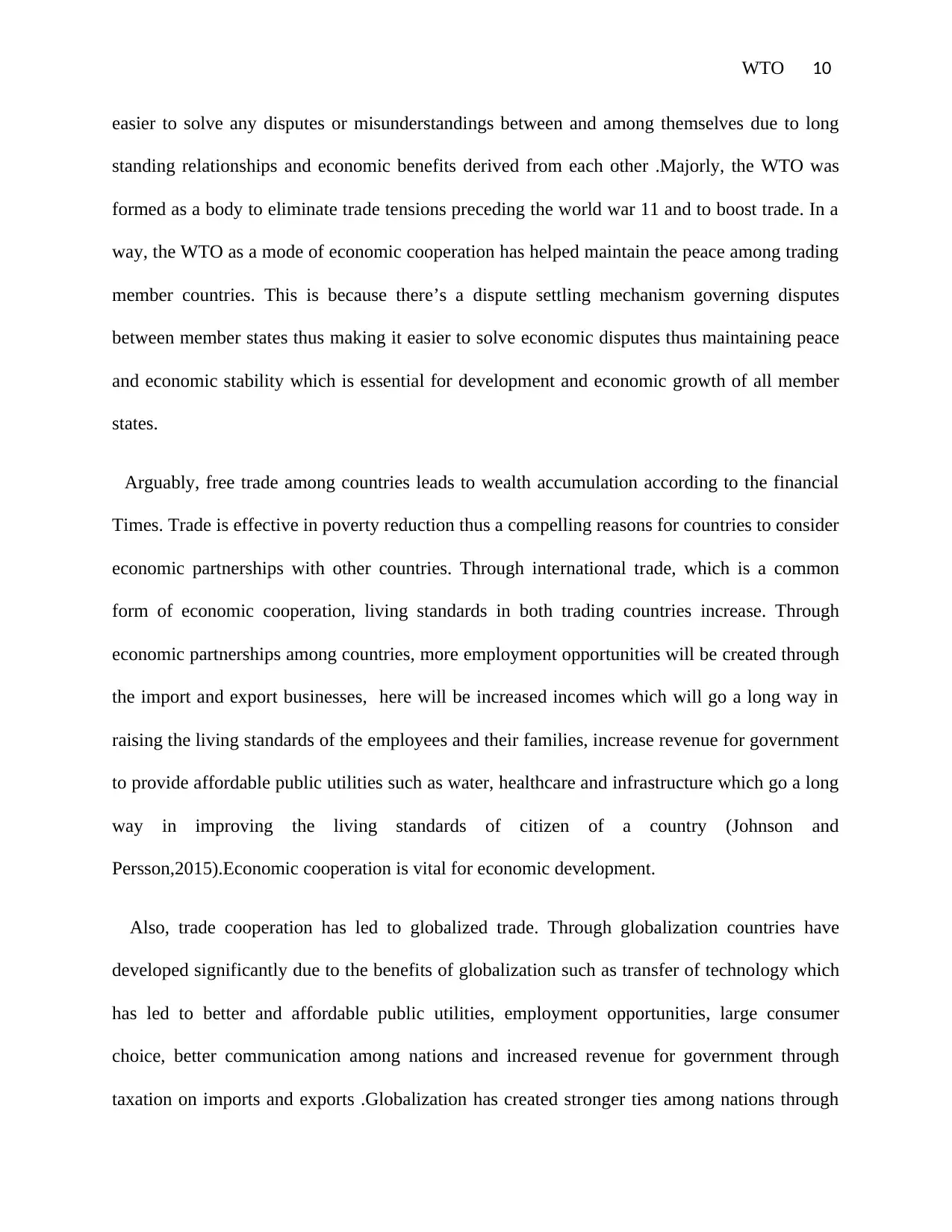
WTO 10
easier to solve any disputes or misunderstandings between and among themselves due to long
standing relationships and economic benefits derived from each other .Majorly, the WTO was
formed as a body to eliminate trade tensions preceding the world war 11 and to boost trade. In a
way, the WTO as a mode of economic cooperation has helped maintain the peace among trading
member countries. This is because there’s a dispute settling mechanism governing disputes
between member states thus making it easier to solve economic disputes thus maintaining peace
and economic stability which is essential for development and economic growth of all member
states.
Arguably, free trade among countries leads to wealth accumulation according to the financial
Times. Trade is effective in poverty reduction thus a compelling reasons for countries to consider
economic partnerships with other countries. Through international trade, which is a common
form of economic cooperation, living standards in both trading countries increase. Through
economic partnerships among countries, more employment opportunities will be created through
the import and export businesses, here will be increased incomes which will go a long way in
raising the living standards of the employees and their families, increase revenue for government
to provide affordable public utilities such as water, healthcare and infrastructure which go a long
way in improving the living standards of citizen of a country (Johnson and
Persson,2015).Economic cooperation is vital for economic development.
Also, trade cooperation has led to globalized trade. Through globalization countries have
developed significantly due to the benefits of globalization such as transfer of technology which
has led to better and affordable public utilities, employment opportunities, large consumer
choice, better communication among nations and increased revenue for government through
taxation on imports and exports .Globalization has created stronger ties among nations through
easier to solve any disputes or misunderstandings between and among themselves due to long
standing relationships and economic benefits derived from each other .Majorly, the WTO was
formed as a body to eliminate trade tensions preceding the world war 11 and to boost trade. In a
way, the WTO as a mode of economic cooperation has helped maintain the peace among trading
member countries. This is because there’s a dispute settling mechanism governing disputes
between member states thus making it easier to solve economic disputes thus maintaining peace
and economic stability which is essential for development and economic growth of all member
states.
Arguably, free trade among countries leads to wealth accumulation according to the financial
Times. Trade is effective in poverty reduction thus a compelling reasons for countries to consider
economic partnerships with other countries. Through international trade, which is a common
form of economic cooperation, living standards in both trading countries increase. Through
economic partnerships among countries, more employment opportunities will be created through
the import and export businesses, here will be increased incomes which will go a long way in
raising the living standards of the employees and their families, increase revenue for government
to provide affordable public utilities such as water, healthcare and infrastructure which go a long
way in improving the living standards of citizen of a country (Johnson and
Persson,2015).Economic cooperation is vital for economic development.
Also, trade cooperation has led to globalized trade. Through globalization countries have
developed significantly due to the benefits of globalization such as transfer of technology which
has led to better and affordable public utilities, employment opportunities, large consumer
choice, better communication among nations and increased revenue for government through
taxation on imports and exports .Globalization has created stronger ties among nations through
Paraphrase This Document
Need a fresh take? Get an instant paraphrase of this document with our AI Paraphraser
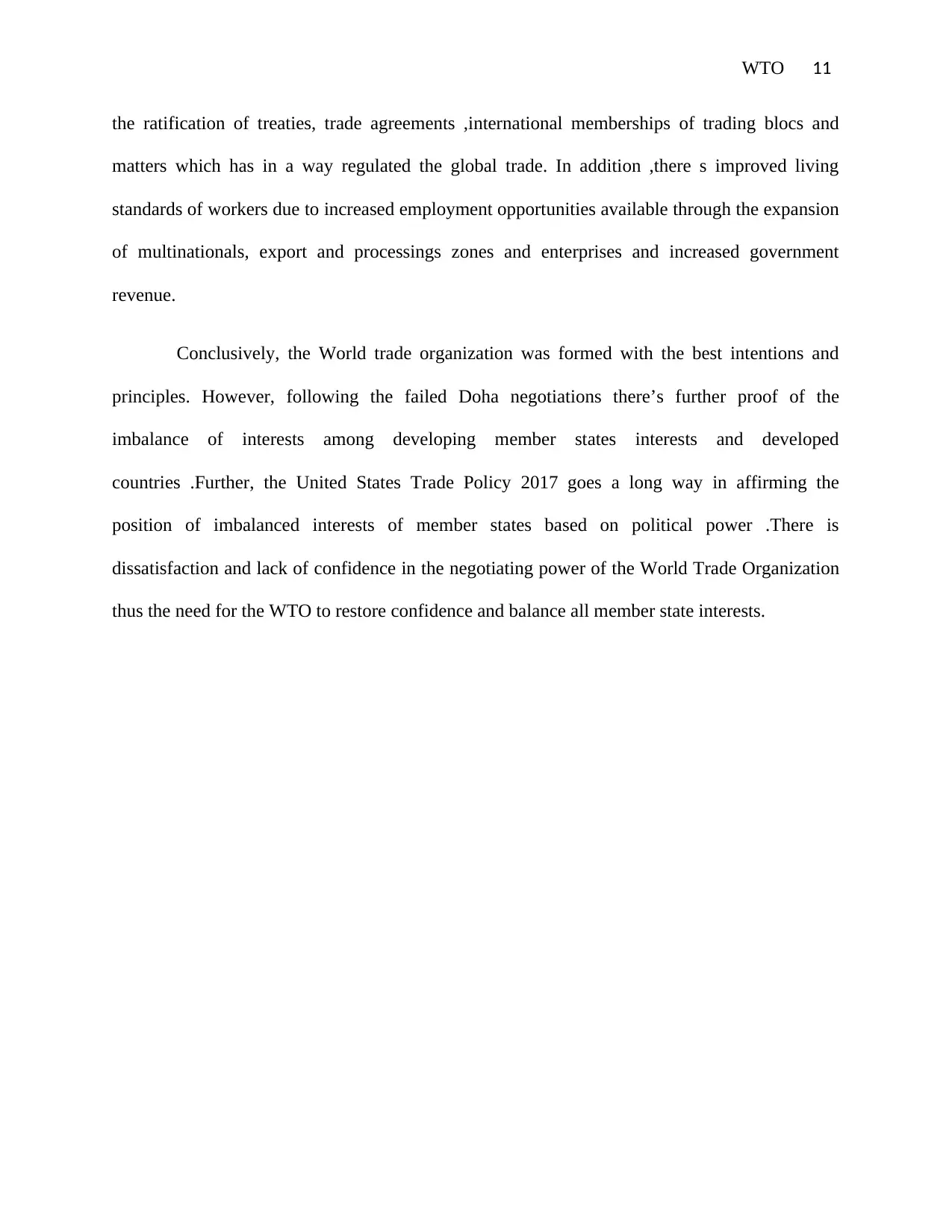
WTO 11
the ratification of treaties, trade agreements ,international memberships of trading blocs and
matters which has in a way regulated the global trade. In addition ,there s improved living
standards of workers due to increased employment opportunities available through the expansion
of multinationals, export and processings zones and enterprises and increased government
revenue.
Conclusively, the World trade organization was formed with the best intentions and
principles. However, following the failed Doha negotiations there’s further proof of the
imbalance of interests among developing member states interests and developed
countries .Further, the United States Trade Policy 2017 goes a long way in affirming the
position of imbalanced interests of member states based on political power .There is
dissatisfaction and lack of confidence in the negotiating power of the World Trade Organization
thus the need for the WTO to restore confidence and balance all member state interests.
the ratification of treaties, trade agreements ,international memberships of trading blocs and
matters which has in a way regulated the global trade. In addition ,there s improved living
standards of workers due to increased employment opportunities available through the expansion
of multinationals, export and processings zones and enterprises and increased government
revenue.
Conclusively, the World trade organization was formed with the best intentions and
principles. However, following the failed Doha negotiations there’s further proof of the
imbalance of interests among developing member states interests and developed
countries .Further, the United States Trade Policy 2017 goes a long way in affirming the
position of imbalanced interests of member states based on political power .There is
dissatisfaction and lack of confidence in the negotiating power of the World Trade Organization
thus the need for the WTO to restore confidence and balance all member state interests.
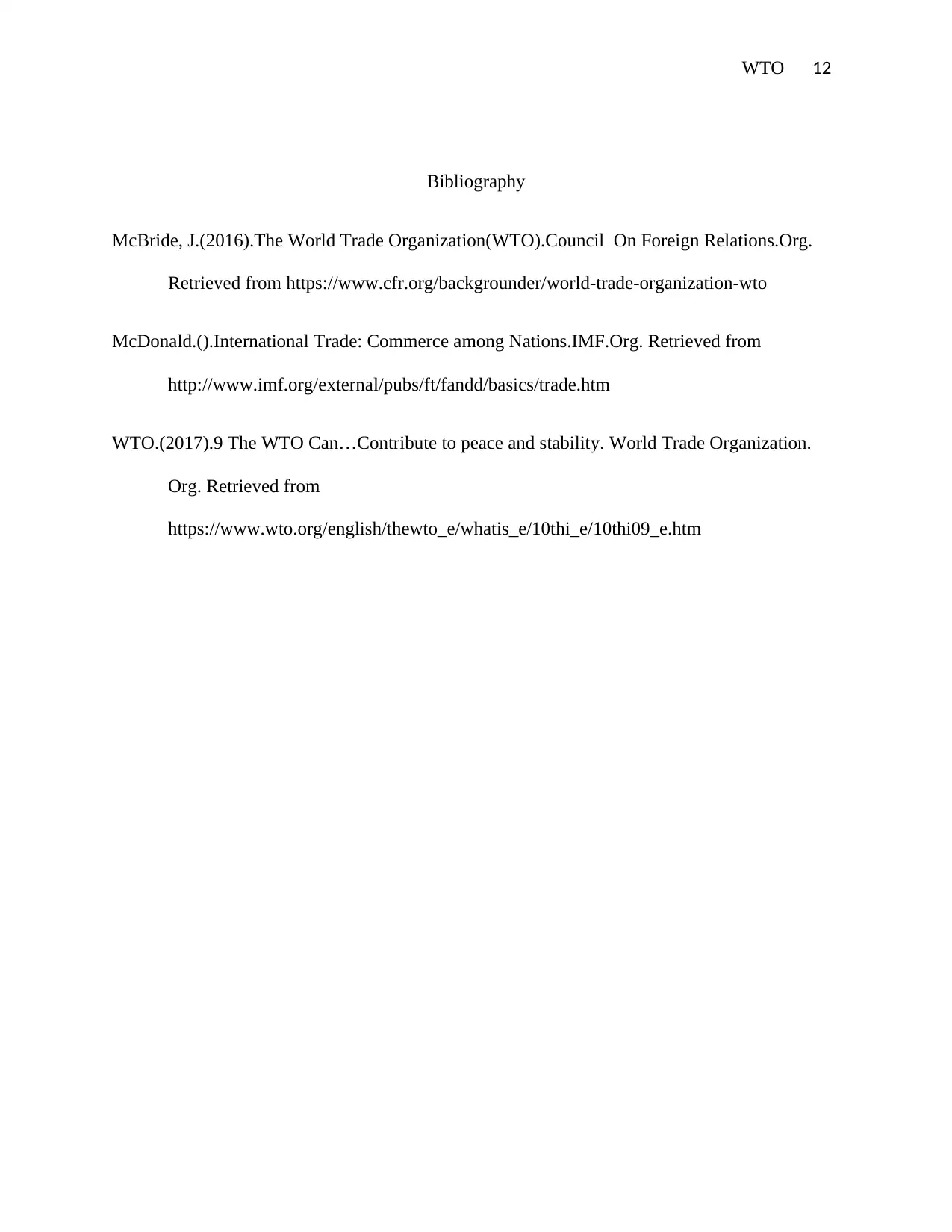
WTO 12
Bibliography
McBride, J.(2016).The World Trade Organization(WTO).Council On Foreign Relations.Org.
Retrieved from https://www.cfr.org/backgrounder/world-trade-organization-wto
McDonald.().International Trade: Commerce among Nations.IMF.Org. Retrieved from
http://www.imf.org/external/pubs/ft/fandd/basics/trade.htm
WTO.(2017).9 The WTO Can…Contribute to peace and stability. World Trade Organization.
Org. Retrieved from
https://www.wto.org/english/thewto_e/whatis_e/10thi_e/10thi09_e.htm
Bibliography
McBride, J.(2016).The World Trade Organization(WTO).Council On Foreign Relations.Org.
Retrieved from https://www.cfr.org/backgrounder/world-trade-organization-wto
McDonald.().International Trade: Commerce among Nations.IMF.Org. Retrieved from
http://www.imf.org/external/pubs/ft/fandd/basics/trade.htm
WTO.(2017).9 The WTO Can…Contribute to peace and stability. World Trade Organization.
Org. Retrieved from
https://www.wto.org/english/thewto_e/whatis_e/10thi_e/10thi09_e.htm
⊘ This is a preview!⊘
Do you want full access?
Subscribe today to unlock all pages.

Trusted by 1+ million students worldwide
1 out of 16
Related Documents
Your All-in-One AI-Powered Toolkit for Academic Success.
+13062052269
info@desklib.com
Available 24*7 on WhatsApp / Email
![[object Object]](/_next/static/media/star-bottom.7253800d.svg)
Unlock your academic potential
Copyright © 2020–2026 A2Z Services. All Rights Reserved. Developed and managed by ZUCOL.




